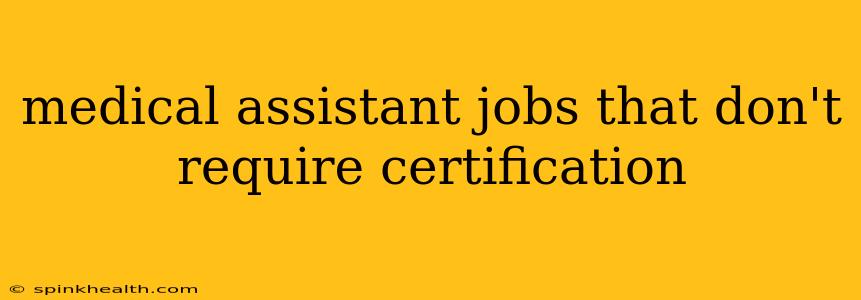Unlocking Healthcare Careers: Medical Assistant Jobs Without Certification
The world of healthcare is vast and varied, offering numerous pathways for those passionate about helping others. While many associate medical assisting with formal certification, the truth is there are several entry-level positions that don't require it. This doesn't mean these roles are less important; in fact, they often serve as crucial stepping stones in the healthcare journey, providing invaluable experience and a potential springboard to higher-level positions. Let's delve into the exciting possibilities.
This journey started for me, Sarah, years ago when I was captivated by the dynamic atmosphere of a local clinic. My fascination with healthcare fueled my determination to find a way in, even without the formal certification that seemed to be a prerequisite for most medical assistant roles. I discovered that many clinics and medical practices were willing to train individuals with a strong work ethic and a genuine passion for patient care. This article reflects my experiences and research to help you navigate this path.
What are some entry-level medical jobs that don't require certification?
This is a common question, and the answer lies in understanding that many healthcare settings need support staff. While certified medical assistants handle more complex tasks, there are plenty of roles involving patient interaction, administrative support, and basic clinical duties that don't necessitate formal certification.
Some examples include:
- Receptionist/Medical Secretary: These roles are the vital front-line of a medical practice. They schedule appointments, answer phones, manage patient records (often using electronic health records, or EHRs), and handle insurance claims. Strong communication and organizational skills are essential.
- Medical Office Assistant: This is a broader term encompassing various administrative and clerical duties within a medical office. You might assist with filing, data entry, ordering supplies, and handling patient correspondence.
- Patient Care Technician (PCT) – in some settings: While PCT roles often require certification in some facilities, other facilities may hire and train staff without prior certification. These roles frequently involve less complex tasks than those performed by certified medical assistants, such as taking vital signs, assisting patients with mobility, and cleaning examination rooms.
- Home Health Aide: While often requiring specific state certifications or training, some agencies might hire individuals and provide the necessary training, particularly for those with prior experience in caregiving environments. This job frequently involves personal care tasks such as bathing, dressing, and meal preparation for patients in their homes.
What skills are important for these jobs?
Regardless of the specific role, certain soft skills and basic competencies are highly valuable:
- Excellent communication skills: You'll be interacting with patients, doctors, and other staff, so clear and professional communication is paramount.
- Organizational skills: Managing appointments, records, and supplies requires meticulous organization.
- Computer proficiency: Most healthcare settings utilize electronic systems, so comfort with computers is essential.
- Attention to detail: Accuracy is critical in healthcare; attention to detail is paramount to avoid errors.
- Empathy and compassion: A caring and empathetic approach is crucial when working with patients.
How can I gain experience to improve my chances?
While certification isn't always mandatory, gaining relevant experience significantly enhances your prospects. Consider:
- Volunteering: Offer your services at a local clinic, hospital, or nursing home. This provides firsthand exposure to the healthcare environment and develops essential skills.
- Shadowing: Shadowing a medical assistant or other healthcare professional allows you to observe daily tasks and gain a better understanding of the work.
- Taking relevant coursework: Community colleges or vocational schools offer courses in medical terminology, medical office procedures, and other relevant areas. This demonstrates your commitment to the field and provides valuable knowledge.
Does working in these roles help me become a certified medical assistant later?
Absolutely! Gaining experience in these entry-level positions provides valuable on-the-job training, making the transition to a certified medical assistant role smoother and more competitive. The experience you gain demonstrates your commitment and proficiency, bolstering your application when you pursue certification later.
My own journey exemplifies this – starting in a receptionist role allowed me to learn the day-to-day operations of a clinic intimately. This experience, coupled with additional training and certification, propelled me into a thriving career as a medical assistant. The path to a fulfilling career in healthcare is often paved with steps like these. Don't be discouraged by the certification requirement – focus on building your skills and demonstrating your dedication, and the opportunities will follow.

